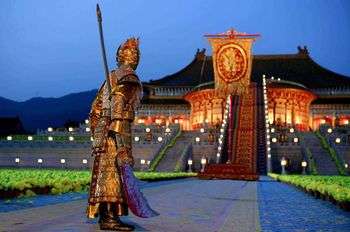Imperial China
Most Western audiences know this period from Asian pop culture sources such as Wuxia movies, or Japanese works such as the Dynasty Warriors series of games and the Romance of the Three Kingdoms anime, though most of these are based on much older Chinese novels, folk-stories and other source material.
Life in Imperial China, according to this view, apparently involved lots of politics and betrayal around the Emperor's solid gold palace, punctuated by battles featuring big hulky brocade-wearing brutes mowing down peasant soldiers by the thousands with their flashy musou attacks. When you met a fair maiden, either she was skilled enough with martial arts to kick your butt, or she was a supernatural creature in disguise.
- Arranged Marriage
- Deadly Decadent Court
- The Emperor
- Evil Chancellor
- Honor Before Reason
- Implausible Fencing Powers
- Improbable Weapon User
- Knight Errant
- Named Weapon
- Old Master
- Red String of Fate
- Reincarnation Romance
- Shapeshifting Lover
- Star-Crossed Lovers
- Supernatural Martial Arts
Chinese works set in this era
- Most Wuxia books, films, TV series etc.
Film
- The Burning of Red Lotus Temple
- Crouching Tiger, Hidden Dragon
- Curse of the Golden Flower
- Detective Dee
- The Emperor and the Assassin
- Fearless
- Flowers of Shanghai
- Green Snake
- Hero
- House of Flying Daggers
- Legend of the Black Scorpion
- Once Upon a Time in China
- The Promise
- Red Cliff
- Tai Chi Master
- Warriors Of Heaven And Earth
- For that matter, more Chinese historical dramas than you can shake a stick at, many of them set in the Qing Dynasty. If you see a queue (that distinctive long pigtail combined with shaved forehead), it's Qing.
- 55 Days at Peking, also set during the Qing Dynasty.
Literature
Live-Action TV
- Much of Towards the Republic
Theatre
- Most Chinese opera
Japanese works set in this era
Anime and Manga
- Kumo No Yo Ni Kaze No Yo Ni (Like the Clouds, Like the Wind)
- The Tale of the White Serpent (白蛇伝)
- Koutetsu Sangokushi
- Koihime Musou
- Saiunkoku Monogatari
- Fushigi Yuugi and Fushigi Yuugi Genbu Kaiden
Literature
- The Favorite by Inoue Yasushi is about Yang Guifei.
Live-Action TV
- There have been at least two Japanese TV production of Journey to the West that use a relatively straight fantasy version of the setting. The 1978 version was dubbed by the BBC as Monkey.
Video Games
Western Works set in this era:
Film
- The early parts of Bertolucci's The Last Emperor.
- Kung Pow: Enter The Fist.
- Shanghai Noon (the early parts).
Literature
- The Judge Dee novels and short stories, though the first is a translation of a Chinese story.
- Several novels by Pearl Buck, including The Good Earth and Peony.
- Snow Flower and the Secret Fan
- Bridge of Birds and its sequels appear in a version where All Myths Are True.
- L'Impératrice de la Soie trilogy by José Frèches.
- Lady of Ch'iao Kuo: Warrior of the South by Lawrence Yep, from The Royal Diaries series.
Live-Action TV
- Some parts of the first Kung Fu TV series.
Theatre
- The stage play and later opera, Turandot.
Video Games
- Jade Empire is set in the role-playing-game fantasy version.
Western Animation
- Mulan, though it's based on a traditional Chinese folk-story.
The Nostalgia Chick: "Sure, let's go ahead and use the word 'honor' fifty times."
- Two episodes of Histeria! were centered around China. Oddly enough, the show's resident Chinese character, Cho-Cho, barely appears in either episode.
